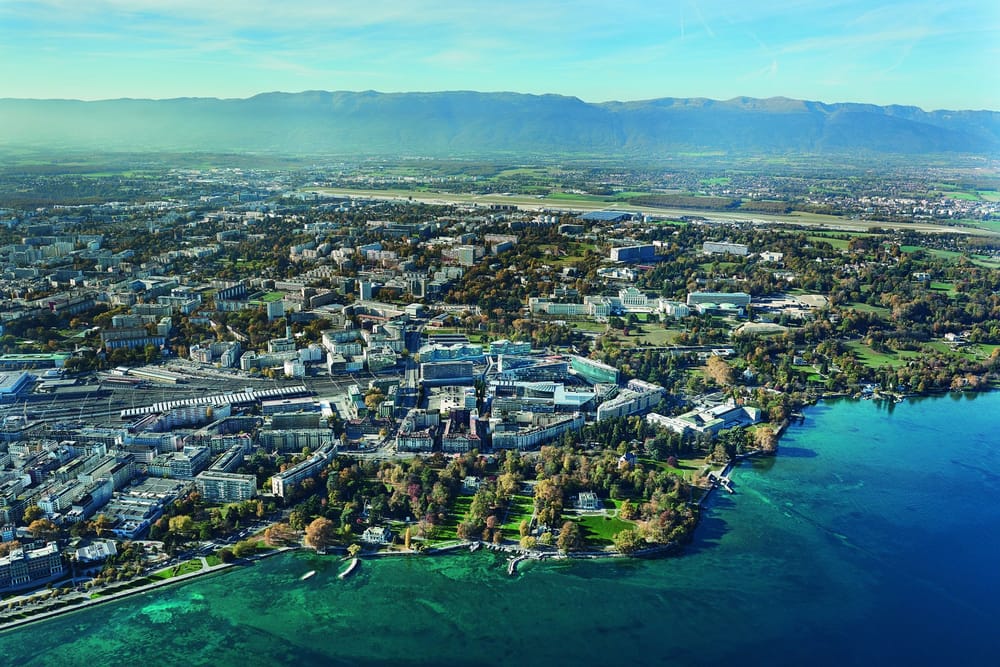By Eunsoo Lee and Moira V. Faul
Mapping the International Geneva ecosystem
The world faces an unprecedented scale of change, symptoms of which include multiple human and environmental shocks/stressors: from increasing inequality to accelerating climate change, growing autocracy and decreasing biodiversity. What transformations are necessary to address the root causes of, and support systemic solutions to, these simultaneous and entangled problems?
International Geneva offers a unique geopolitical context for the coexistence of organisations and individuals working towards aligned endeavours (such as the Sustainable Development Goals); an ecosystem that can either curtail or accelerate decision-making, goal achievement and funding. 45% of Geneva-based organisations consider education and cognitive, emotional human development important for achieving planetary transition goals. What demands may arise from as yet unclear future orientations of education and human development? How can International Geneva respond to critical shifts taking place in the governing and financing of education and other entangled development issues?
Three critical shifts
We identified three interconnected trends which are deeply embedded in geopolitical and economic shifts in recent years, and that continue to affect the strategic positioning of Geneva as well as organisations operating in the city and across its international networks. These trends are not exclusive to the field of education. They have been observed throughout the international development sector, highlighting the interconnected nature of education and other development goals and governance.
Localisation
Narratives of localisation have been implemented throughout the development and humanitarian sectors. In 2021, USAID committed to dedicating 25% of its budget to local partners in the next 4 years, and to incorporate local leadership in 50% of its programming by the end of the decade. Programmes such as Centroamérica Local and the Africa Localization Initiative testify to this shift towards localisation, which emerged as a response to decolonial critiques and donors’ desire to decrease their transaction costs. Changes in organisational mandates are re-orientating funding, often away from traditional IOs and global NGOs to organisations rooted in local contexts, deepens the need for collaboration in the Geneva ecosystem.
Diversification and fragmentation
Numerous articles have reported on the phenomenon of “peak aid”, which denotes how traditional education aid has plateaued in the past decade. Concerns have been raised about how the pandemic and austerity measures following global recession might impact this further. Changes have been observed in the diversification of funding sources, from increased (yet still insufficient) involvement of private capital in areas formerly dominated by public institutions to the growing share of aid and loans from “non-traditional” donors such as China, India and Saudi Arabia. There has also been a multiplication of funding mechanisms, seen in pooled funding bodies for SDG4 (such as the Global Partnership for Education) or combinations with other SDGs or humanitarian concerns (e.g. Education Cannot Wait funding education in emergencies). Diversification is a double-edged sword, as it may entail innovation but also lead to a fragmentation of aid, where overarching objectives are split into smaller agendas that compete with each other for scarce resources. In response, calls for a new global compact on education financing have emerged.
Decentralisation
Growing confidence in remote work following COVID-19 lockdowns prompted decentralised modes of operation among organisations based in traditional HQ cities. In a 2021 survey, 65% of NGOs based in Geneva reported reduced interaction with IOs at the height of the pandemic in Europe, while a few considered moving to lower-cost locations. There have already been strategic relocations of organisations from traditional HQ cities to the Global South, such as Oxfam International’s move to Nairobi in 2018 and ActionAid’s move to Johannesburg in 2004.
These three emerging shifts of localisation, diversification and decentralisation show that the spaces in which we organise ourselves — the physical locations, compositions of actors and systems of governance — are progressively shifting. Working in this context, new kinds of collaboration are needed that do not rely on tactics of concentration and proximity of key organisations alone; tactics which were never sufficient.
Three pathways for change
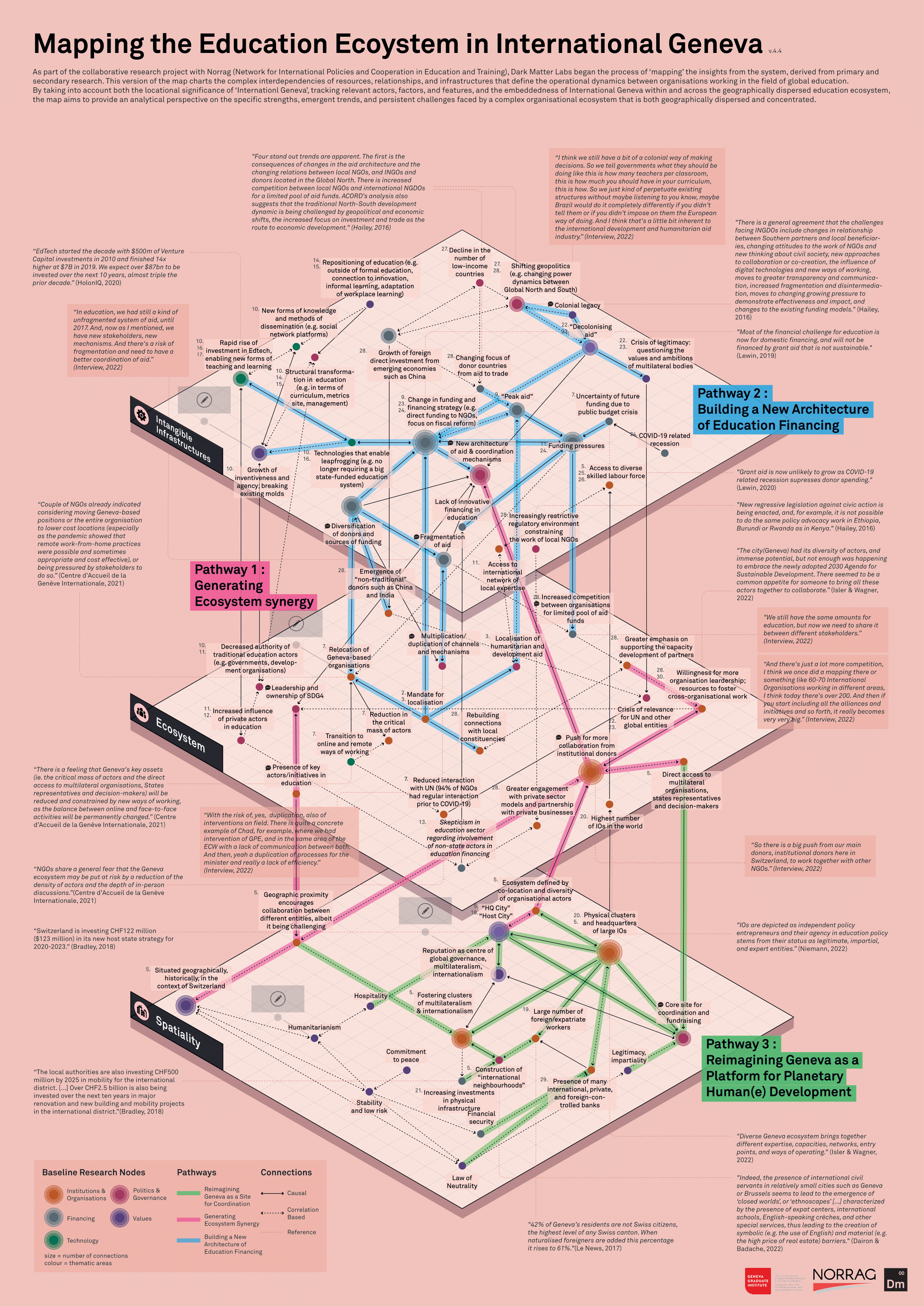
We developed a systems map (Figure 1) through which we identified three pathways that emerged from mapping 65 nodes and analysing the patterns of their 143 connections. These pathways function as hypotheses that guide us to a propositional space built upon the shifts described above.
Generating ecosystem synergy
Diversification of actors, new modes of working, and intersectoral initiatives across several SDGs indicate a growing demand for more networked and collaborative modes of operation. Success depends on nurturing an ecosystem that connects actors beyond as well as within the boundaries of Geneva. It also requires creating synergies between organisations big and small, with diverse values and ways of organising. Yet, existing networks and flows within Geneva are highly centralised — a consequence of aggregating key system actors in one place. As balances of power shift under geopolitical and economic influences, could we imagine a more distributed version of this ecosystem?
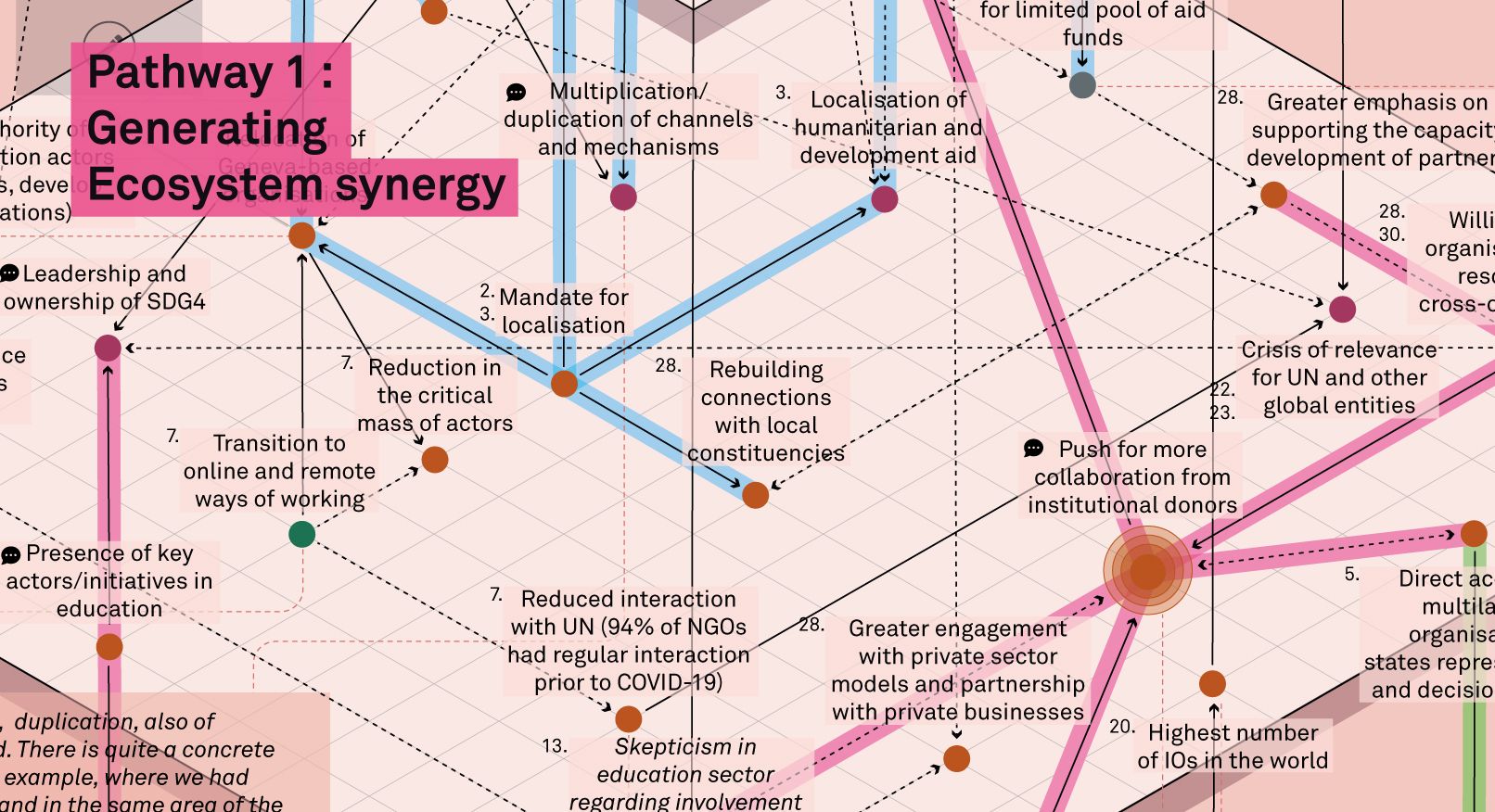
Building a new architecture of education financing
The need for new financing arrangements have been echoed by many, but the solutions to date have led to further fragmentation of the aid structure and its objectives. We need to invest in a new architecture of education financing that can aggregate and collaborate effectively, and build new trust mechanisms as well, which will allow actors to process and direct financial flows in ways that go beyond utilising legacy institutions and infrastructures.
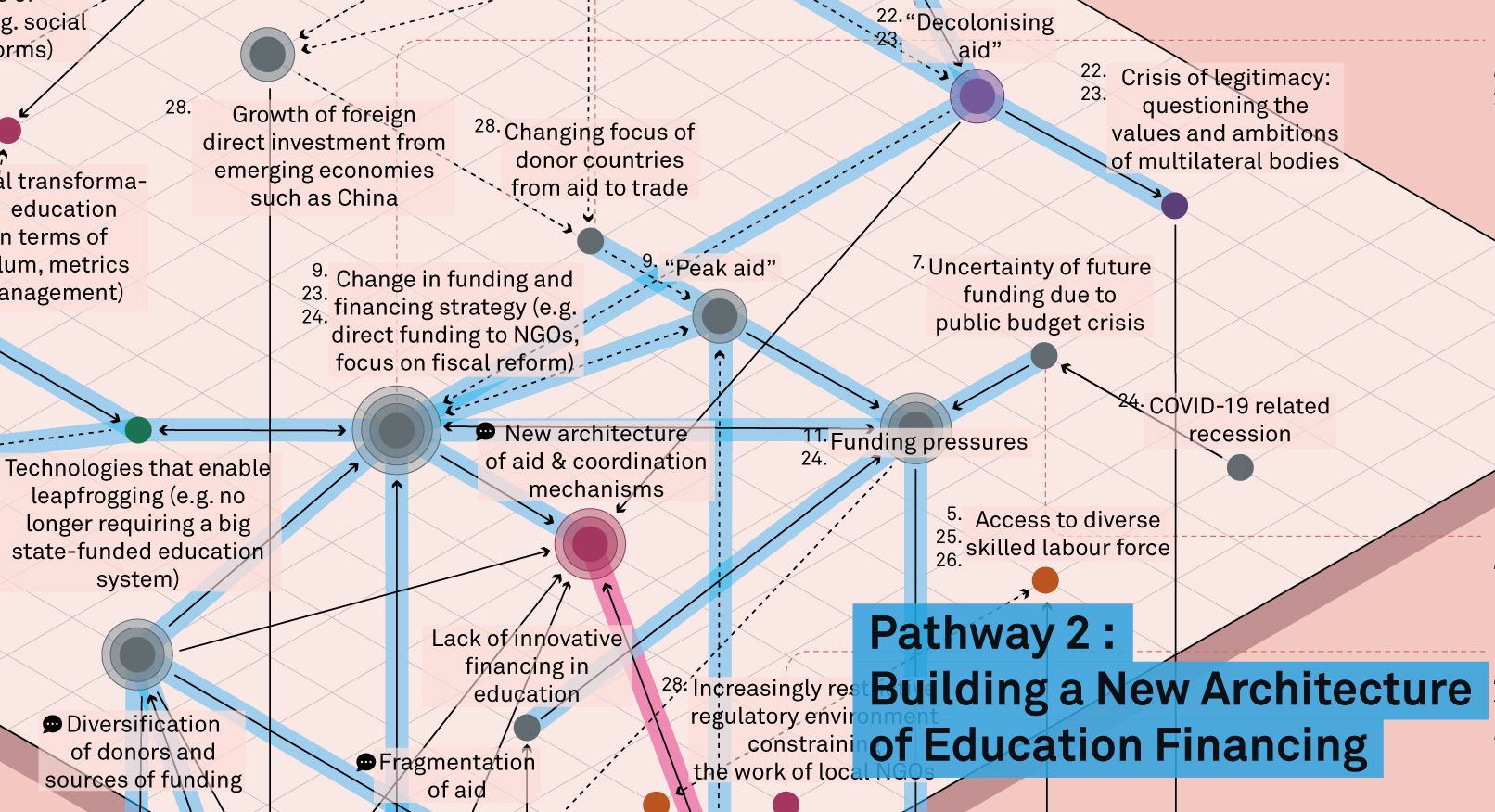
Reimagining Geneva as a platform for planetary human(e) development
Geneva is a unique city, defined by its historical commitment to multilateralism, diplomacy and its present concentration of major IOs, NGOs and foundations working towards interrelated SDGs. Could we imagine a platform for “planetary human(e) development” that uses existing legacies and resources of an HQ city — the convening of key actors, capacity for diplomacy, and collaboration of funding, information, advocacy — to build new models of shared governance?
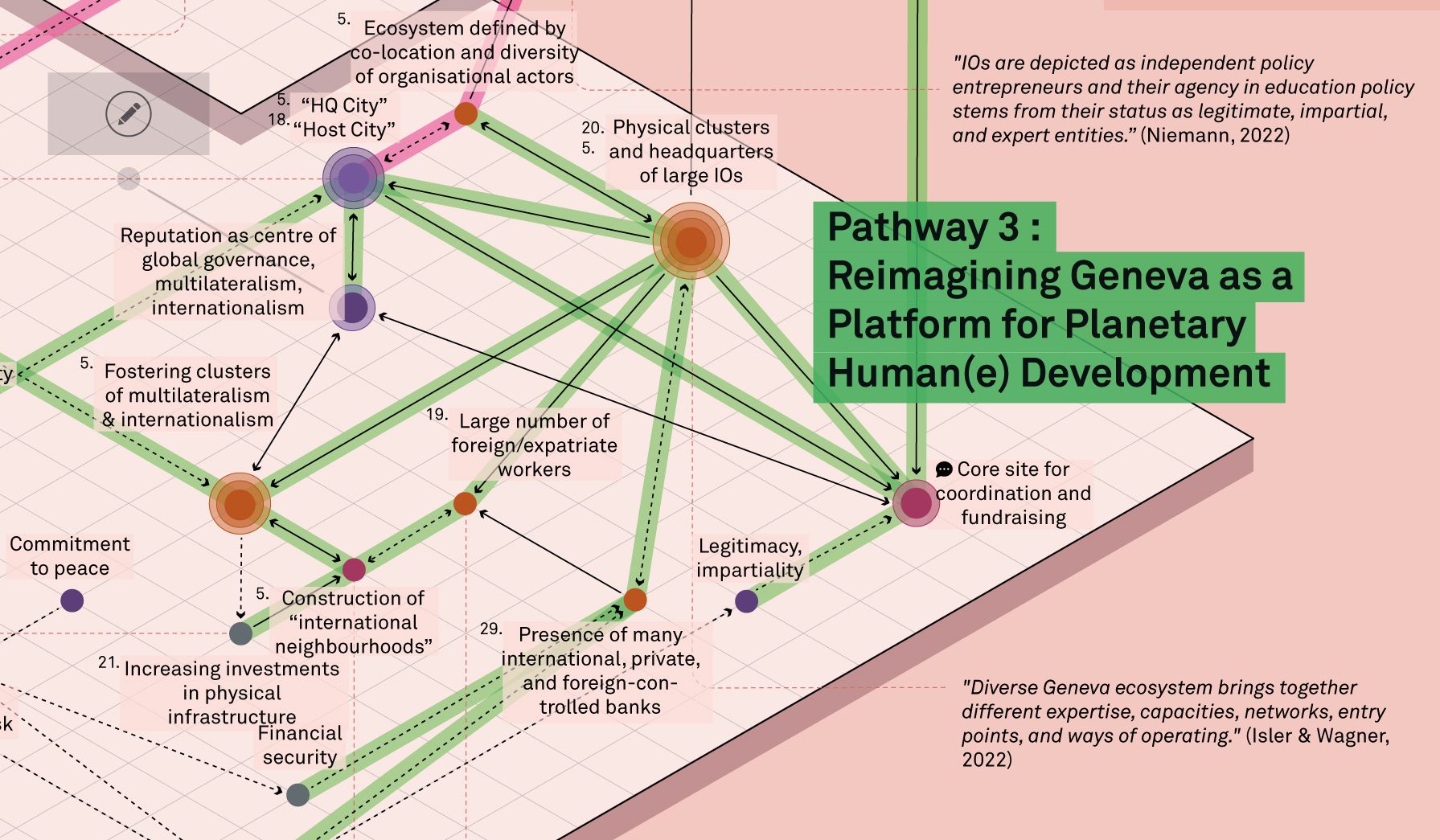
Three critical actions
There is a strategic opportunity now for International Geneva and its supporters to think and act differently, to address education and its interconnected social, environmental and economic domains as a foundation for building planetary developmental capacity. For this, we need to scrutinise how work in Geneva and in the world affect each other, and leverage the existing Geneva ecosystem while decentralising power and decision making through these three critical actions:
- Re-orient governance away from a mode of control to convening — facilitating strategic diplomacy and systemic collaboration.
- Invest in aligned endeavours — linking different SDGs while respecting the contribution of each, and enabling collaboration across single-issue institutions in Geneva.
- Rebuild International Geneva’s mission by listening to — and empowering — those most affected but least heard, especially in the Global South.
Embracing transition
Reinventing and fostering a learning ecosystem in International Geneva will help build thriving education systems supported by institutions that are themselves constantly evolving. In response to geopolitical and economic shifts, International Geneva and its learning ecosystem has the opportunity to construct a solid basis for planetary human(e) development by nurturing translocal, shared governance.
About the Authors
Eunsoo Lee
As a strategic designer and researcher at Dark Matter Labs, Eunsoo has worked on topics spanning international development and urban governance, with diverse partners including UNDP, RewirEd, The END Fund and Bloomberg Philanthropies.
Moira V. Faul
Senior Lecturer at the Geneva Graduate Institute and Executive Director of NORRAG, Moira uses systems, network and narrative approaches to research power, partnerships, financing and inequalities in issues such as climate change, education, health and refugee crises.
Disclaimer
The opinions expressed in this publication are those of the authors. They do not purport to reflect the opinions or views of the Geneva Policy Outlook or its partner organisations.



